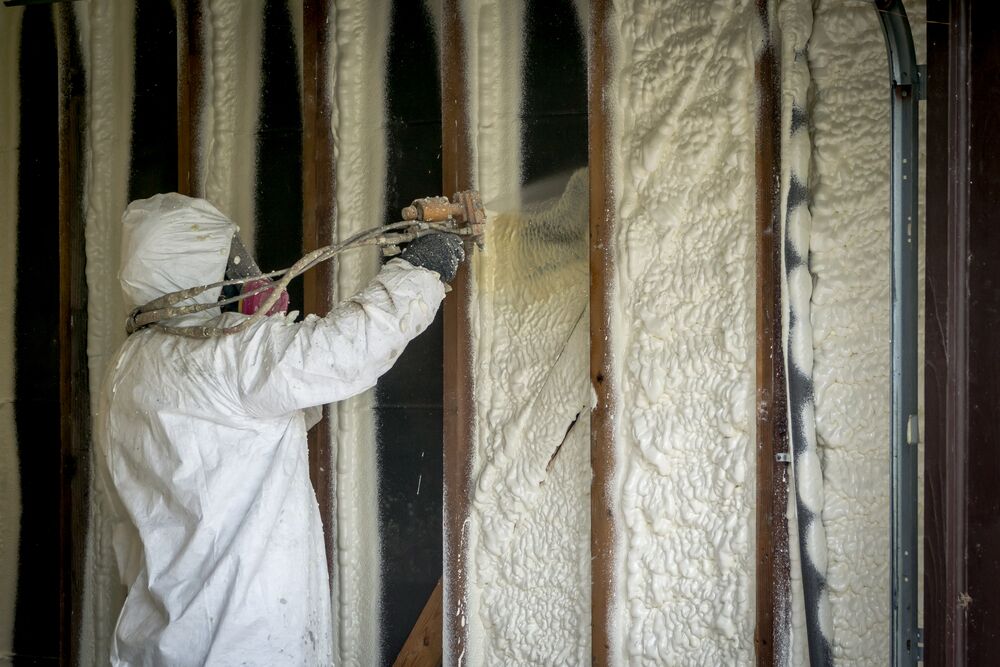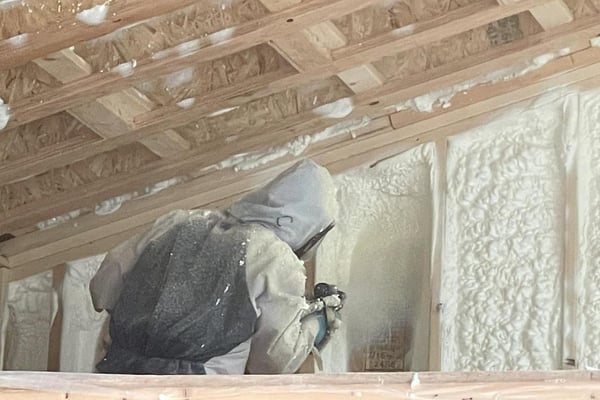The Process of Applying Spray Foam: What You Required to Know
The Process of Applying Spray Foam: What You Required to Know
Blog Article
Spray Foam: The Ultimate Remedy for Air Sealing and Insulation
Spray foam insulation has arised as a leading service for effective air securing and thermal insulation, using a special combination of residential or commercial properties that establish it apart from standard methods. Comprehending the full range of its advantages, setup procedures, and comparisons with various other insulation types is critical for making notified choices.
What Is Spray Foam?
Spray foam is a flexible insulation product that combines the concepts of air sealing and thermal resistance to improve power effectiveness in buildings. Composed mostly of polyurethane or various other comparable substances, spray foam is applied as a fluid that broadens upon call with surface areas, producing a strong, continual layer of insulation. This distinct property enables it to load gaps, cracks, and spaces that typical insulation products may neglect, giving a superior air seal.
There are two primary kinds of spray foam: open-cell and closed-cell. Open-cell spray foam is lighter and extra flexible, providing exceptional audio absorption and a reduced R-value per inch - Spray Foam. In contrast, closed-cell spray foam is denser, giving a greater R-value, wetness resistance, and added structural stability to constructing parts
The application process normally entails specialized equipment, guaranteeing a seamless application that sticks to different substrates, including wood, concrete, and steel. This flexibility makes spray foam appropriate for both new buildings and retrofitting existing frameworks. Its capacity to develop an impermeable obstacle dramatically adds to minimizing energy consumption and improving interior air high quality, consequently making it a favored option amongst home owners and home builders alike.
Benefits of Spray Foam Insulation
One of one of the most considerable advantages of spray foam insulation is its remarkable capacity to produce a continuous air barrier, which efficiently minimizes power loss. Unlike conventional insulation products, spray foam broadens to fill splits and gaps, guaranteeing that air leak is dramatically decreased. This characteristic not just improves power effectiveness yet likewise causes lower energy bills gradually.
Additionally, spray foam insulation supplies superior thermal resistance, contributing to a much more stable indoor setting. Its high R-value per inch permits efficient insulation in constrained rooms, making it optimal for attic rooms, walls, and crawl areas. The moisture-resistant residential properties of spray foam aid avoid mold and mold development, advertising healthier living problems.
An additional critical advantage of spray foam insulation is its sound-dampening high qualities (Spray Foam). It properly minimizes noise transmission between spaces, producing a quieter and a lot more comfy home setting. The durability of spray foam additionally sticks out, as it does not droop or settle gradually, maintaining its efficiency throughout its lifespan
Exactly How Spray Foam Works
Understanding just how spray foam insulation works is essential for valuing its efficiency in air sealing and thermal resistance. Spray foam insulation includes 2 main elements: isocyanate and polyol resin. When these elements are blended, they undertake a chemical response that causes the product to expand swiftly, developing a dense foam that loads spaces, cracks, and dental caries.
As the foam broadens, it follows surfaces, forming an airtight seal that considerably decreases air infiltration. This characteristic makes spray foam insulation extremely reliable at stopping drafts and moisture penetration, which can lead to power loss and damages with time. Furthermore, the closed-cell variation of spray foam supplies premium thermal resistance due to its stiff framework, efficiently decreasing warm transfer.
The distinct properties of spray foam allow it to adapt uneven surfaces, making sure comprehensive coverage and a smooth barrier. Therefore, spray foam insulation not only enhances power effectiveness however also adds to boosted interior air top quality by minimizing the buildup of irritants and pollutants. Inevitably, recognizing the technicians behind spray foam highlights its duty as a premium choice for insulation and air securing in both property and commercial applications.
Installation Process Summary

Before installation, the room has to be properly cleansed and prepped, making sure that surface areas are without debris, dust, and moisture. Because impurities can endanger attachment and overall performance, this action is critical. When the location is prepared, the application includes blending both elements of website link the spray foam, which broadens upon contact and loads spaces efficiently.
Trained specialists need to carry out the installation, utilizing customized tools to guarantee consistent insurance coverage and optimal density. Safety safety measures, including using safety gear and making sure appropriate ventilation, are imperative during this process. After application, the foam commonly cures quickly, developing a strong barrier that enhances power efficiency.
Comparing Spray Foam to Typical Insulation
When examining insulation alternatives, spray foam insulation stands apart in read review contrast to typical products such as fiberglass and cellulose. Among the key benefits of spray foam is its premium air securing abilities. Unlike fiberglass and cellulose, which can permit air seepage, spray foam expands upon application, filling gaps and spaces to develop an airtight seal. This causes improved energy performance, as much less warmed or cooled air runs away the home, leading to lower energy expenses.
Additionally, spray foam gives a greater R-value per inch than conventional insulation kinds, offering more reliable thermal resistance in a thinner account. This particular is specifically helpful in spaces with minimal dental caries deepness. Spray foam is resistant to moisture and mold and mildew development, which can be a considerable problem with cellulose and fiberglass, especially in humid settings.
Nonetheless, spray foam insulation typically carries a higher upfront expense than its conventional counterparts. Home owners must evaluate this initial investment versus long-lasting power savings and performance benefits. Ultimately, while both insulation kinds offer their objective, spray foam becomes a much more sophisticated option for contemporary insulation needs, specifically in regards to air securing and thermal efficiency.

Verdict
In summary, spray foam insulation represents a highly efficient remedy for achieving optimum air sealing and thermal resistance. Its one-of-a-kind residential properties, consisting of dampness resistance and noise dampening, make it suitable for different applications in both brand-new buildings and retrofitting projects (Spray Foam). Although the initial expenses may be greater compared to standard insulation materials, the lasting benefits, such as significant energy savings and boosted indoor air high quality, warrant the financial investment and emphasize its worth in modern-day building practices.
Spray foam insulation has actually arised as a leading option for reliable air sealing you can try here and thermal insulation, using an one-of-a-kind mix of properties that set it apart from typical approaches.Spray foam is a functional insulation product that integrates the concepts of air securing and thermal resistance to improve power efficiency in buildings.When reviewing insulation alternatives, spray foam insulation stands out in contrast to typical materials such as fiberglass and cellulose. Eventually, while both insulation kinds serve their objective, spray foam emerges as a more advanced option for contemporary insulation needs, specifically in terms of air securing and thermal efficiency.
In recap, spray foam insulation represents an extremely reliable remedy for accomplishing ideal air securing and thermal resistance.
Report this page